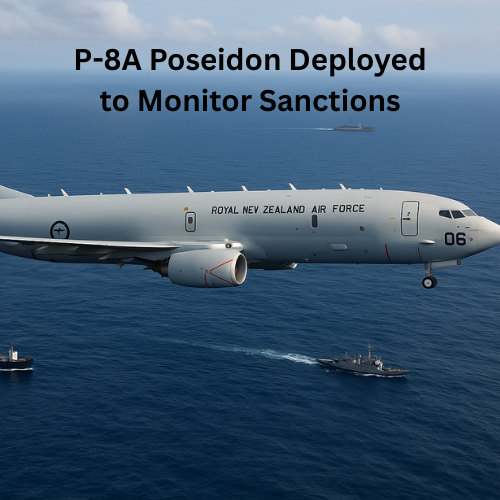The Royal New Zealand Air Force (RNZAF) has deployed one of its newest aircraft, the P-8A Poseidon, to Japan. Its job is to help watch over the waters around East Asia to make sure that international rules are being followed, especially by North Korea.
For four weeks, the plane and its crew will look out for any ships transferring goods to North Korean vessels at sea. These types of ship-to-ship transfers are often used to secretly supply materials for North Korea’s nuclear weapons and missile programs. These activities are against United Nations (UN) rules.
The deployment is part of a big international effort called the Pacific Security Maritime Exchange (PSMX). This group brings together many countries that work together to monitor North Korea and make sure they follow the UN sanctions. New Zealand’s contribution shows its strong support for keeping the region safe and peaceful.
New Zealand has been part of these operations since 2018, regularly sending patrol planes and navy ships to help keep watch. The RNZAF’s work helps enforce the international system of rules that many countries rely on to prevent conflicts and promote peace.
Tariff Dodging Exposed! South Korea Seizes $20 Million in Fraudulent ‘Made in Korea’ Goods
What the RNZAF Poseidon Will Do
The P-8A Poseidon is a very modern and advanced surveillance aircraft. It can fly long distances and has special equipment to find ships at sea. This makes it perfect for spotting illegal transfers between vessels.
While based at a Japanese naval base, the Poseidon and its crew will patrol the nearby seas, looking for any signs of suspicious activities. If they see ships passing goods in ways that break the rules, they can report it quickly to the international team.
The New Zealand Defence Force (NZDF) says this mission is a very important contribution to keeping the world safe. By taking part in these patrols, New Zealand is helping to encourage North Korea to stop building dangerous weapons and return to peaceful talks with other countries.
New Zealand’s efforts are part of a much bigger team. Other countries are also using planes and ships to monitor the waters, making it harder for North Korea to break the rules. Together, they are making sure the UN sanctions are respected and enforced.
Aurora Rising: Canada’s Secret Weapon Scans for Sanctions-Busting Ships Near North Korea
Challenges and Future Support
Although the NZDF remains strongly committed to these important missions, it has been facing some difficulties. Last December, the Defence Force explained that they were managing shortages of personnel and resources. Even so, they made it clear that key missions, like the Poseidon deployment to Japan, are still going ahead as planned.
Earlier this month, the New Zealand government announced a major boost in funding for defence. Over the next four years, $9 billion will be spent to strengthen New Zealand’s armed forces. Defence was highlighted as one of the few areas where new spending will be given top priority in the upcoming national budget.
This new funding will help support important missions like the one the Poseidon is currently undertaking. It also shows the government’s commitment to making sure the NZDF has what it needs to protect New Zealand’s interests and help maintain peace around the world.
China Warns New Zealand Over ‘False’ Spy Claims—Tensions Explode
The RNZAF’s Poseidon deployment to Japan is just one part of a wider, ongoing effort by New Zealand and its partners to watch over the oceans and stop illegal activities that threaten security. The Defence Force has confirmed that more deployments to support this operation are planned for later this year.


